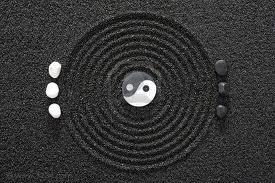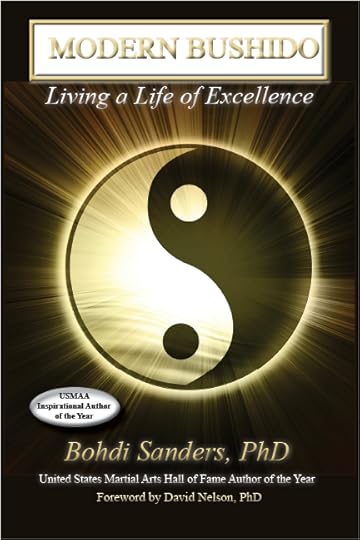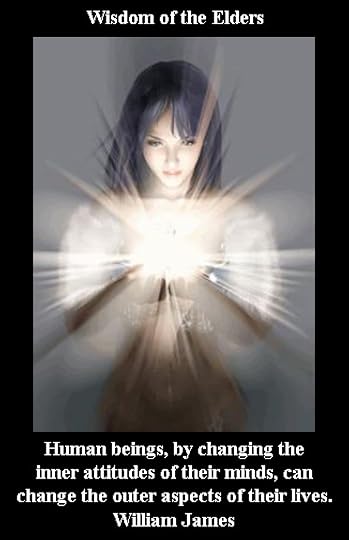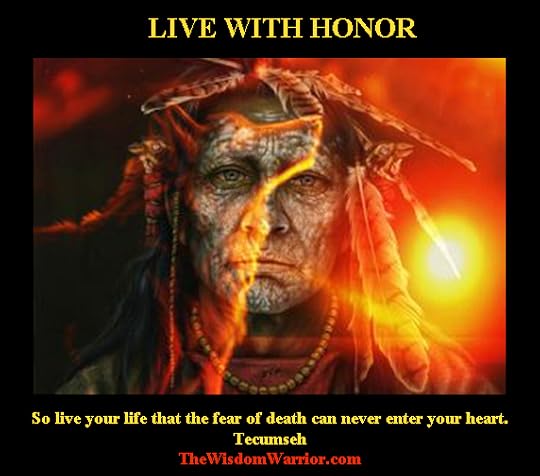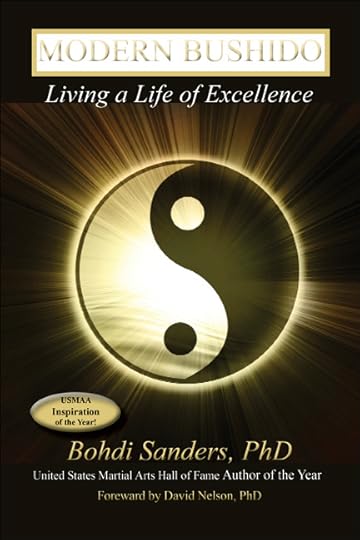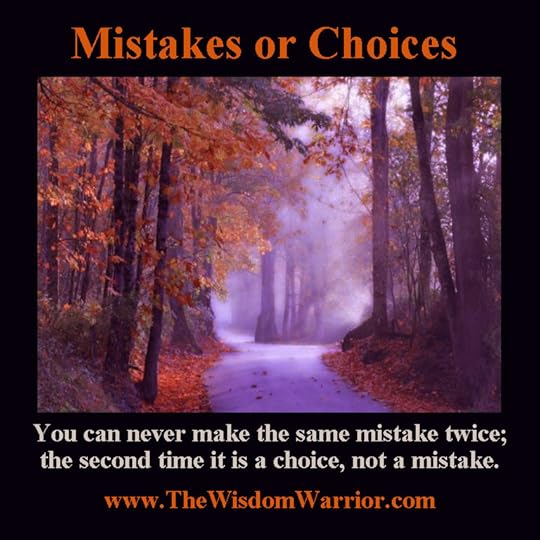Bohdi Sanders's Blog, page 31
January 19, 2012
The Tale of Two Pebbles
Tale of Two Pebbles
Many years ago in a small Indian village, a farmer had the misfortune
of owing a large sum of money to a village moneylender. The moneylender,
who was old and ugly, fancied the farmer's beautiful daughter. So he
proposed a bargain.
He said he would forgo the farmer's debt if he could marry his daughter.
Both the farmer and his daughter were horrified by the proposal. So the
cunning money-lender suggested that they let providence decide the
matter. He told them that he would put a black pebble and a white pebble
into an empty money bag. Then the girl would have to pick one pebble
from the bag.
1) If she picked the black pebble, she would become his wife and her
father's debt would be forgiven.
2) If she picked the white pebble she need not marry him and her
father's debt would still be forgiven.
3) If she refused to pick a pebble, her father would be thrown into
jail.
They were standing on a pebble strewn path in the farmer's field. As
they talked, the moneylender bent over to pick up two pebbles. As he
picked them up, the sharp-eyed girl noticed that he had picked up two
black pebbles and put them into the bag. He then asked the girl to pick
a pebble from the bag.
Now, imagine that you were standing in the field. What would you have
done if you were the girl? If you had to advise her, what would you have
told her?
Careful analysis would produce three possibilities:
1. The girl should refuse to take a pebble.
2. The girl should know that there were two black pebbles in the bag and
expose the money-lender as a cheat.
3. The girl should pick a black pebble and sacrifice herself in order to
save her father from his debt and imprisonment.
Take a moment to ponder over the story. The above story is used with the
hope that it will make us appreciate the difference between lateral and
logical thinking. The girl's dilemma cannot be solved with traditional
logical thinking. Think of the consequences if she chooses the above
logical answers.
What would you recommend that the girl do?
Well, here is what she did. . .
The girl put her hand into the moneybag and drew out a pebble.
Without looking at it, she fumbled and let it fall onto the
pebble-strewn path where it immediately became lost among all the other pebbles.
"Oh, how clumsy of me!" she said. "But never mind, if you look into the
bag for the one that is left, you will be able to tell which pebble I
picked."
Since the remaining pebble is black, it must be assumed that she had
picked the white one.
And since the money-lender dared not admit his dishonesty, the girl
changed what seemed an impossible situation into an extremely
advantageous one.
MORAL OF THE STORY?
Most complex problems do have a solution. It is only that we don't
attempt to think or we confuse worry with constructive thinking.
There is always a way out; you just have to find it.
Have a week filled with positive thoughts and sound decisions.
Bohdi Sanders
CLICK HERE TO SEE BOOKS BY BOHDI SANDERS
January 16, 2012
Spiritual Power and Human Perception
Spiritual Power and Human Perception
Ponder all things, and establish high your mind.
Pythagoras
The majority of people tend to be overly sure about how things on this earth are. They are willing to fight over their opinions, even if their opinions are unfounded. They will confidently tell you how the world works, what is possible and impossible, and what should and should not be done, all according to their own personal understanding of the world.
Of course their understanding of the world is based only on what they have seen, heard, experienced, or read. With most people, this is merely a miniscule fraction of the knowledge that mankind has, and the knowledge that mankind actually has is a drop in the bucket compared to what we do not know.
On top of that, each person tends to see things through a set of filters, filters which have many complex layers. Your experiences affect how you perceive things, what you believe, and basically what you think about the world in general.
People should not be so sure of what is and what is not possible, or about how the world really is. The fact is, when it really comes down to it, they do not know. When you base your opinions on only what you personally see, hear or feel, it is easy to feel that you are correct because you believe that you have experienced something personally and therefore "you know."
But that is not always the case. For example, you have all seen sand. There is probably no one reading this that has not played in sand or walked in sand at one time or another. If I asked you if you know what sand looks like, your answer would be, "Of course I do!" You would say this with complete confidence and no doubts.
But do you really know what sand truly looks like? Probably not. Oh, of course you know what sand looks like to you, but do you know what sand actually looks like in reality? I mean, what it looks like to God. The link below shows you the reality that you cannot perceive with your physical eyes, at least not without some help.
A CLOSER LOOK AT SAND ~ THIS WILL AMAZE YOU!
Hummmmm… Has your perception of sand changed some, now that you have seen sand from another side? I bet it has. This same reality can be applied to most things in life.
Do you really understand who and what you are? Most people will quickly answer, "Of course I do." But take a minute and ponder whether you truly know who and what you are. Do you really know who and what you are or do you merely know what you can perceive with your physical senses and the limited ability of your mind?
Maybe there is more to you than meets the eye. Maybe if you could see yourself through the eyes of God, you would see something much more beautiful, exquisite, and powerful than your mind can even imagine.
If an ordinary grain of sand looks so beautiful and amazing when seen as it truly is, imagine how you must look through the eyes of God. What does the part of you, which is unseen to the human eye, truly look like? What could you actually do if you used all of the power available to you?
Imagine the spiritual and mental power that you have, which you are unaware of simply because you have never seen it or used it. Is there much more power available to you than you thought there was? Do you have abilities that you have never even imagined?
Just like there is much more to a "common" grain of sand than meets the eye, there is much more to you than you know. Maybe it is time for you to tap into the unseen and see yourself as you truly are, and start using the power that you truly have to change things in your life and in your world. Don't sell yourself short. You don't have to see yourself through ordinary eyes. Be brave enough to take a much closer look and you may find that what you thought you knew, only scratched the surface of reality.
The landscape lies far and fair within, and the deepest thinker is the farthest traveled.
Thoreau
Bohdi Sanders
author of:
Secrets of the Soul: Your Guide to Uncovering Your Hidden Beliefs
and Modern Bushido: Living a Life of Excellence.
Click here to see books by Bohdi Sanders
January 13, 2012
What Makes A True Warrior?
What Makes A True Warrior?
Warriors are not what you think of as warriors.
The warrior is not someone who fights.
Chief Sitting Bull
There are a group of so-called "experts" (self-proclaimed experts I might add) in the world of martial arts/self-defense who constantly opine that being a warrior is nothing more than being paid to engage in war. This is such an ignorant point of view that one would think no one would take them seriously, but in fact, they have quite a large following. These "experts" publish books which proclaim their "expertise" in everything to do with violence and "real" self-defense. They slam traditional martial arts as outdated and useless on the streets. They mock the fact that honor, character and integrity play a major part in being a true warrior, and instead, insist that being a warrior is nothing more than taking orders on the battlefield.
While everyone is entitled to his or her own opinion, no matter how asinine it may be, when someone has young, impressionable people reading and hanging on every word that he writes or speaks, he has a responsibility to the truth. The truth of the matter is that this definition of a warrior is shallow, opinionated, narrow, and, well, simply untrue. I know that this may offend many people, but the unvarnished truth usually does.
A master warrior is a man of character, a man of wisdom and insight.
Forrest E. Morgan
The truth is that what these people declare to be a warrior is one of three things: a soldier, a mercenary, or just plain a thug. A soldier takes orders and does exactly what he is told. That is his job. This does not make him or her a warrior. Don't get me wrong, there are many true warriors who are soldiers. The military is packed full of true warriors, but this doesn't mean that everyone in the military or who has been to war is a true warrior. I can show you of many examples of soldiers, who have gone to war and who are not true warriors.
Mercenaries are involved in war, killing, and battles of many kinds, but that doesn't make them true warriors. In fact, I would argue that most mercenaries are far from being true warriors. They value money over life, and most will do whatever they are paid to do, as long as the money is right.
Is this the attitude of a true warrior? Not in my book, and not according to many people throughout history who were both involved in war and were also true warriors. Killing someone does not make you a warrior, it simply makes you someone who has killed another human being – period. These people have little if any honor or principles, both which are required to be a true warrior.
The man of principle never forgets what he is, because of what others are.
Baltasar Gracian
There are also many trained thugs out there. Some are on the battlefield, some are in the police departments, some are on the streets robbing people, and some are found in martial arts dojos. Just because someone is trained to fight, to use firearms, or to go to war, doesn't make them a true warrior.
The people who write and teach the philosophy that a warrior is merely someone who engages in war, merely teach this train of thought because they can't measure up to the real requirements which make someone a true warrior. Their character falls short, so they downplay the importance of such traits as honor and integrity.
Keep your distance from unvirtuous people.
Takuan Soho
If you study what true warriors have said on this issue throughout history, you will find that the men and women that commanded men and women on battlefields agree, being a true warrior requires much more than simply being involved in war. In fact, the vast majority of them will state that war has nothing to do with being a true warrior.
So what does make someone a true warrior? The answer lies much deeper than any battlefield. At the core of every true warrior you will find the traits of honor, integrity and justice. Yes, I know that the people that I described above will laugh and state that "being a warrior has nothing to do with character or honor." They will shout that these traits have nothing to do with war or with the warrior, and will do so with the same enthusiasm that you hear in their voices when they pat themselves on the back for being so tough. But, they are wrong – period.
While it is true that the word did originate from the term "war," and can mean someone who takes part or is experienced in warfare. This definition is not the one that should be used to define the true warrior, and is not an accurate definition for the warrior lifestyle. A better definition for a warrior is, "Somebody who takes part in a struggle or conflict." No, this is not my definition; it actually comes from Webster's dictionary.
The true warrior is engaged in a struggle and it is a daily fight. His battle is not necessarily on the battlefield, but rather a personal battle to perfect his character and to become a man of excellence in every area of his life. And, according to those who have "been there and done that," being on the battlefield doesn't make one a warrior. For someone to be a true warrior, he has to have honor and character. Without those traits, as well as others, he is simply a trained thug.
The true warrior is not a programmed killing machine, although he has the ability and the knowledge to render lethal applications of his skills if his duty requires such extreme actions. Though he is capable of rendering devastating injury to others, he never desires to do so. He is a man of peace and benevolence.
His training in the martial arts is strictly for defense. The warrior pursues knowledge in the art of self-defense and martial arts in order to keep himself and those around him safe, not for personal egotistical reasons.
Honor is central to warriorship.
Forrest E. Morgan
The great Sioux chief, Sitting Bull, once stated that, "Warriors are not what you think of as warriors. The warrior is not someone who fights…" He goes on to explain himself saying, "The warrior, for us, is one who sacrifices himself for the good of others. His task is to take care of the elderly, the defenseless, those who cannot provide for themselves, and above all, the children, the future of humanity."
This is what he was doing at the Battle of the Little Big Horn, fighting for those who needed his protection, and this is also a very good description of the true warrior and the warrior lifestyle. This takes much more than martial arts or military training. This takes character and honor, the exact things which some well-known authors proclaim have nothing to do with warriorship.
Character and honor are only two of the traits which are essential to the true warrior; there are many more. I will not list them all in this short article for the sake of space. The point is, being a true warrior is much more involved than these self-proclaimed experts would have people think.
Don't believe the macho, "I'm tougher than you" BS that these authors, "experts" and lecturers assault people's intelligence with on a regular basis. It is not true. Being a true warrior is a lifestyle choice, not a profession.
Hear all sides and you will be enlightened.
Hear one side, and you will be in the dark.
Wei Zheng
Bohdi Sanders
author of: The Warrior Wisdom Series and Modern Bushido
January 6, 2012
NOW AVAILABLE! Modern Bushido: Living a Life of Excellence
Exciting News!
My new book, MODERN BUSHIDO: Living a Life of Excellence,
has been released and is now available!
To celebrate the release of my new book, I am offering the best package deal I have ever offered.
Be one of the first 100 people to buy a copy of MODERN BUSHIDO and receive a
1st edition, signed copy of my award winning book, Warrior Wisdom ABSOLUTELY FREE!
This package deal is only available on The Wisdom Warrior website and not on Amazon, and is only available for the first 100 orders.
Here is the link to order your copy of MODERN BUSHIDO today and get this special deal:
I hope you guys enjoy MODERN BUSHIDO and find it useful in your life's journey!
Bohdi Sanders
November 11, 2011
Mistakes or Choices
October 4, 2011
Procrastination has Consequences
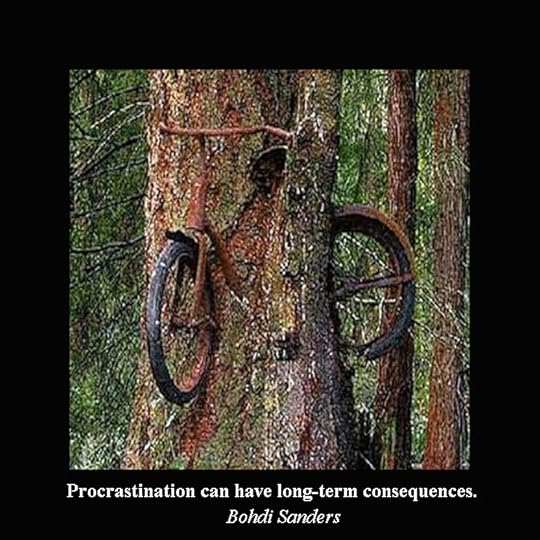
Procrastination has Consequences
Procrastination has Consequences
There is no act, however trivial, but has its train of consequences.
Samuel Smiles
Procrastination always has consequences. This is just the way the Universe works. You are only allotted a finite amount of time to live your life and you shouldn't waste it. Your days will go by much faster than you can imagine. Before you know it, you will be looking back at your life and saying that it seems like only yesterday when you did this or that, when it was actually 20 or 30 years ago. Procrastinating is simply wasting your time, especially when you are procrastinating concerning important things.
Procrastination not only waste your time, but it can cost you important opportunities. There are many times when you have to act, and act quickly, in order to seize the opportunity that the Universe has brought to you. If you procrastinate, as far a taking advantage of that opportunity, that small window of opportunity may well disappear. You have to be prepared to act, and then take action. In many cases, tomorrow is too late.
For opportunity knocks at your door just once, and in many cases you have to decide and to act quickly.
Francesco Guicciardini
Don't misunderstand me. I'm not saying that you should act without first reflecting on everything and looking at all the angles. That would basically be gambling. You should always think about the situation and examine all the possible outcomes. But after you have done your homework, you have to be decisive – one way or another. Not making a decision is simply procrastinating where the decision process is concerned, and this can cause you to lose many good opportunities.
You should examine all the information, do your homework, discuss the situation with those who have the knowledge that you need to make a wise decision, and then make your mind up, one way or the other. So many times people are too afraid of making the wrong decision, so they simply procrastinate when it comes to the decision making process. The fear of making the wrong decision paralyzes them, thus causing them to lose by default. Not taking action due to the fear of making a wrong decision, is in fact, an action in and of itself; and allowing fear to guide your actions is unwise.
The success of very important matters often depends on doing or not doing something that seems trivial. Even in little things, therefore, you must be cautious and thoughtful.
Francesco Guicciardini
Instead of making decisions based on fear, you should make your decisions based on your rational thought process. Look at all the information and make an informed decision. Then stick by your decision, no matter what happens. If you have done your homework, meditated on the situation at hand, and made a rational decision, don't second guess yourself. You have done the best that you could do. At this point, feel good that you had the courage to step up and believe in yourself, whether the final outcome ends up being positive or negative.
Another important thing to remember is that procrastinating is not the same thing as deciding to be patient and not take any action at this moment. There is a big difference between procrastinating and making a conscience decision to wait. Deciding to wait patiently until a better time, or until you have more information, is making a firm decision to take action. While the action is that of waiting, it is not the same thing as procrastinating. Procrastinating is a form of laziness or an unwillingness to deal with something at this time. Patiently waiting is a strategic action. There is a huge difference in these two actions.
Every action we take, everything we do, is either a victory or defeat in the struggle to become what we want to be.
Anne Byrhhe
Even if you lose out on the great deal because of your decision to patiently wait for more information or strategically wait for a more opportune time to act, you can still feel good about the fact that you made a decision and are willing to stand by it and deal with the consequences. While procrastinating may have had the same outcome in the end, you will not feel good about losing an opportunity because of your unwillingness to address the situation. Do you see the difference? One is a strategic decision and the other is no decision at all.
When you have something that needs to be handled, take care of it. Don't put it off because you aren't in the mood to deal with it. Nobody else is going to take care of your business for you; it is completely in your hands. If you wait too long, the consequences of your procrastination could very well be irreversible. It is acceptable to lose because of making a wrong decision when you have done your best; it is not acceptable to lose because of your laziness or lack of self-discipline. Don't procrastinate. Take care of your business and keep your affairs in order.
Carpe diem!
Bohdi Sanders
The Wisdom Warrior

